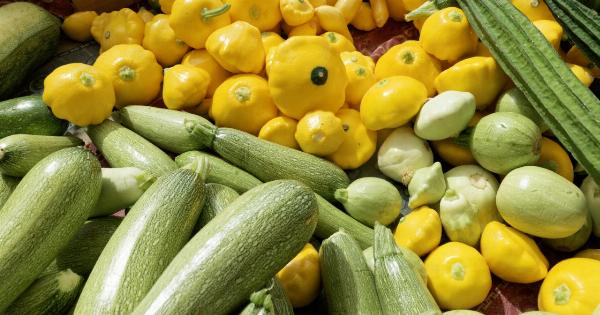A healthy diet plays a crucial role in maintaining good eye health. While carrots are often associated with promoting healthy vision, there are several other vegetables that offer a wide range of nutrients beneficial for your eyes.
Incorporating these vegetables into your daily meals can provide essential vitamins and minerals to support excellent eye health and potentially reduce the risk of certain eye diseases. Learn about ten vegetables that promote healthy vision and explore the various nutrients they contain.
1. Spinach
Spinach is a leafy green vegetable known for its high nutritional value. It is an excellent source of lutein, zeaxanthin, vitamin C, beta-carotene, and vitamin E, all of which are important for maintaining good vision.
Lutein and zeaxanthin help protect the eyes from harmful blue light and may reduce the risk of age-related macular degeneration (AMD) and cataracts. Vitamin C and beta-carotene are powerful antioxidants that combat oxidative stress, while vitamin E helps maintain overall eye health.
2. Kale
Kale is another leafy green vegetable packed with essential nutrients for healthy eyes. It contains high levels of lutein, zeaxanthin, vitamin C, and beta-carotene.
The combination of these nutrients helps protect the eyes from damage caused by free radicals and harmful UV radiation. Regular consumption of kale may contribute to a decreased risk of cataracts and AMD. Moreover, kale is rich in vitamins A and K, which also support eye health.
3. Broccoli
Broccoli is a cruciferous vegetable that offers numerous health benefits, including eye health. It contains high levels of lutein, zeaxanthin, beta-carotene, vitamin C, and vitamin E.
These antioxidants help reduce the risk of chronic eye diseases and protect the eyes from oxidative damage. Regular consumption of broccoli can also improve the body’s absorption of certain nutrients, enhancing their overall benefits to the eyes.
4. Carrots
Carrots have long been associated with eye health due to their high beta-carotene content, which the body converts into vitamin A. Vitamin A is essential for maintaining good vision and preventing night blindness.
Carrots also contain lutein, zeaxanthin, and vitamin C, further enhancing their ability to support eye health. Regular consumption of carrots can help delay age-related vision problems and improve overall eye function.
5. Bell Peppers
Bell peppers come in various vibrant colors, and each color offers different eye-boosting benefits.
Red bell peppers, for example, contain high levels of vitamin C, which strengthens blood vessels in the eyes and may reduce the risk of cataracts and AMD. They also contain vitamin A and beta-carotene, which promote good night vision. Yellow and orange bell peppers are rich in zeaxanthin and lutein, which support overall eye health.
6. Sweet Potatoes
Sweet potatoes are a delicious and nutritious root vegetable that can contribute to better eye health. They are an excellent source of beta-carotene, which the body converts into vitamin A.
Vitamin A is vital for preventing night blindness and maintaining the health of the cornea. Additionally, sweet potatoes contain antioxidants, including vitamins C and E, which help protect the eyes from oxidative damage.
7. Brussels Sprouts
Brussels sprouts, a member of the cruciferous vegetable family, contain several nutrients that promote healthy eyes. They are rich in vitamins C and E, which protect the eyes from cellular damage and contribute to better overall eye health.
Brussels sprouts also contain lutein and zeaxanthin, offering protection against age-related eye conditions.
8. Tomatoes
Tomatoes are a versatile vegetable known for their richness in lycopene, an antioxidant that gives them their vibrant red color.
Lycopene has been linked to a reduced risk of cataracts and AMD, making tomatoes an excellent addition to a vision-boosting diet. Additionally, tomatoes provide vitamin C, vitamin E, and beta-carotene, offering further eye health benefits.
9. Asparagus
Asparagus is a nutrient-packed vegetable that contributes to better overall eye health. It contains high levels of vitamins A and C, which help protect the retina and prevent the formation of cataracts.
Asparagus is also a good source of zeaxanthin and lutein, offering antioxidant benefits to the eyes and reducing the risk of developing chronic eye conditions.
10. Peas
Peas are not only delicious but also beneficial for maintaining healthy vision. They contain a variety of nutrients, including vitamins A, C, and E, which contribute to good eye health.
Peas also contain lutein and zeaxanthin, providing antioxidant protection against oxidative stress in the eyes. Regular consumption of peas can support the prevention of age-related eye diseases and maintain clear vision.
Conclusion
Incorporating a variety of vegetables into your diet can significantly contribute to excellent eye health.
Spinach, kale, broccoli, carrots, bell peppers, sweet potatoes, Brussels sprouts, tomatoes, asparagus, and peas are all vegetables that promote healthy vision. These vegetables offer a range of essential nutrients such as lutein, zeaxanthin, beta-carotene, vitamins A, C, and E, all of which play vital roles in maintaining good visual health.
Including these vegetables in your daily meals can help protect against age-related eye diseases, reduce the risk of cataracts and AMD, and support overall eye function.





























